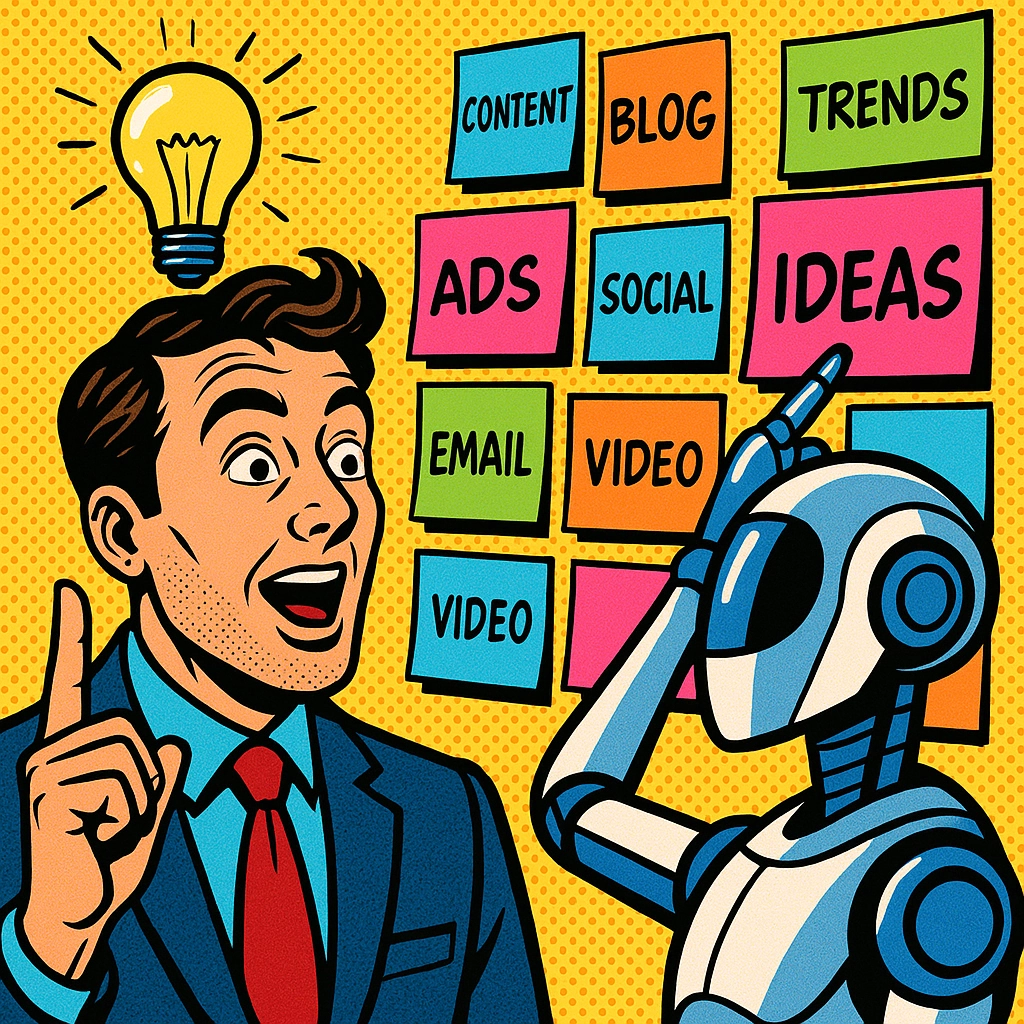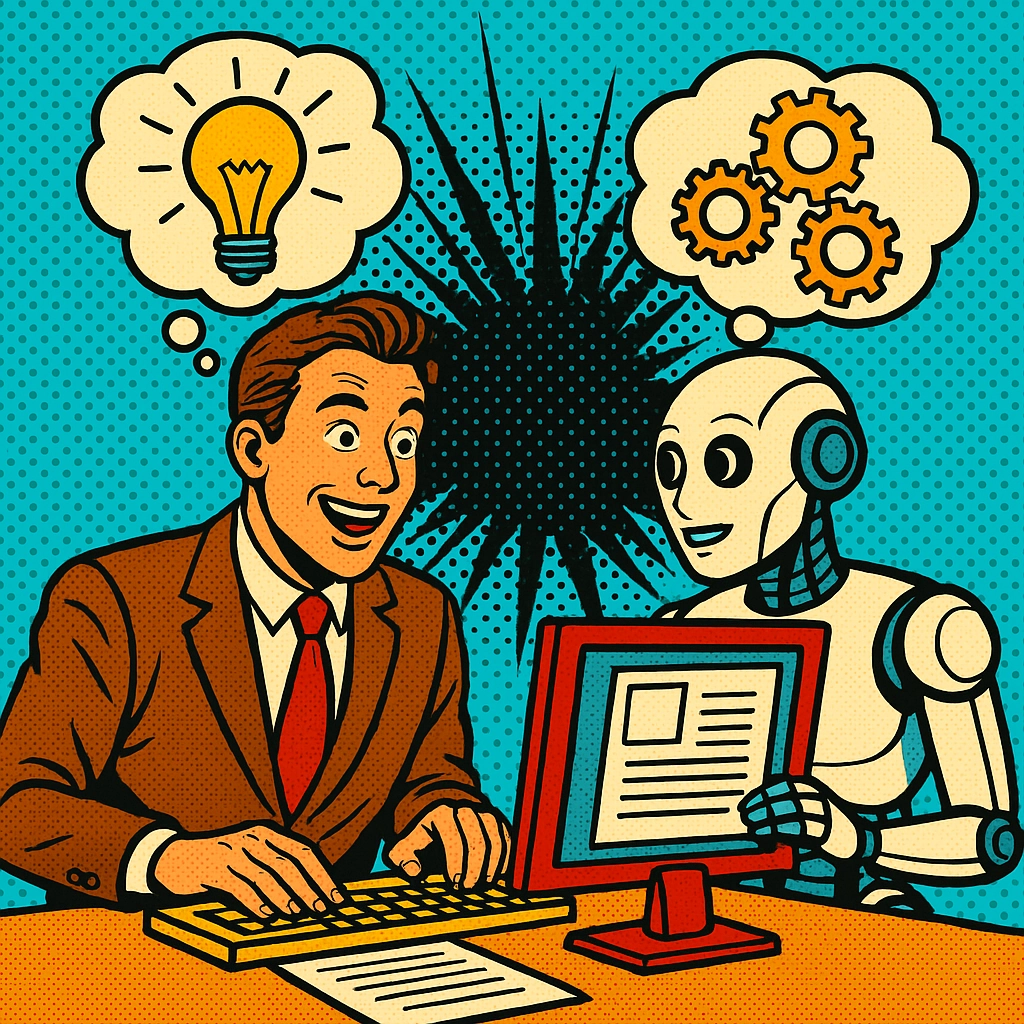Content marketing in 2025 looks dramatically different than it did just a few years ago. The arrival of sophisticated AI tools has transformed how businesses conceptualize, create, and distribute content. What once required an entire marketing team can now often be accomplished by a small team—or even a solo entrepreneur—with the right AI toolkit.
Let's explore how savvy marketers are leveraging AI to drive their content strategies forward, boost engagement, and deliver measurable results.
🤖 AI-Powered Brainstorming and Ideation
The blank page has always been marketing's greatest nemesis. Now, AI offers a solution to writer's block and creative stagnation:
Topic Discovery: AI can analyze trending topics, search queries, and audience interests to suggest content themes that align with your business goals. Tools like Ideamap AI can generate dozens of concepts in minutes, allowing you to select the most promising ideas for development.
Content Calendars: Planning months of content can be overwhelming. AI assistants can map out comprehensive content calendars based on your marketing objectives, seasonal trends, and previous performance data.
Competitor Analysis: AI tools can scan competitor content to identify gaps in your strategy, helping you discover untapped topics that your audience craves.

At Marblism, our AI blog writer Penny doesn't just write—she actively suggests relevant topics based on industry trends and your audience's interests. Many of our clients report that these AI-generated ideas often become their highest-performing content.
✍️ Drafting and Content Creation
Content creation traditionally consumes the most time in any marketing strategy. AI dramatically accelerates this process:
First-Draft Generation: AI can produce complete drafts of blog posts, social media captions, email newsletters, and product descriptions in seconds rather than hours. While human refinement is essential, starting with an AI-generated draft can reduce production time by up to 80%.
Content Repurposing: One brilliant capability of AI is transforming existing content into new formats. A single blog post can become a Twitter thread, LinkedIn article, email sequence, and podcast script—all with minimal human intervention.
Multilingual Content: Expanding to international markets? AI translation has evolved far beyond simple word replacement to deliver culturally appropriate adaptations of your content for global audiences.
"The content creators who will thrive in the AI era aren't those who resist technology, but those who master the art of prompt engineering and post-generation editing. The new skill is knowing how to direct AI, not compete with it."
Consider this formula for effective AI content creation:
- Human-defined strategy and goals
- AI-assisted research and drafting
- Human refinement and brand voice application
- AI-powered optimization and distribution
- Human analysis of performance metrics
⚙️ Optimization and Personalization
Creating content is only half the battle—optimization ensures it performs well and reaches the right audience:
SEO Enhancement: AI tools can analyze your content against top-ranking competitors, suggesting improvements to structure, keyword usage, readability, and more. They can identify missing subtopics, recommend link opportunities, and ensure proper semantic coverage.
Personalization at Scale: Modern AI can help segment your audience and customize content elements for different user groups. This might include dynamically changing examples, CTAs, or even entire sections based on user attributes.
A/B Testing Automation: AI can generate multiple content variations and automatically test them against your audience, learning which approaches drive better engagement over time.
Content Optimization Checklist
✅ Analyze target keywords and search intent
✅ Review content structure against top-performing competitors
✅ Enhance readability scores and emotional appeal
✅ Optimize meta data and schema markup
✅ Personalize CTAs based on user behavior
✅ Test headline variations for click-through performance
✅ Adjust content length for optimal engagement
📊 Data Analysis and Insights
The feedback loop is where AI truly shines in content marketing, providing insights that humans might miss:
Performance Prediction: Advanced AI can now predict how well a piece of content will perform before you publish it, allowing for pre-emptive optimization.
Sentiment Analysis: Tools can analyze audience comments and social mentions to gauge emotional response to your content, helping refine your approach.
Content Decay Detection: AI systems can monitor your content library, alerting you when previously high-performing pieces begin to lose traffic so you can refresh them.

At Marblism, Stan, our AI Sales Rep, goes beyond basic analytics by actively identifying which content pieces are driving leads and conversions, helping businesses double down on what works and refine what doesn't.
🛠 Key AI Tools for Content Marketing
| Use Case | Tools | Key Benefits | Best For |
|---|---|---|---|
| Ideation & Research | Ideamap AI, ChatGPT | Topic discovery, trend analysis | Strategy development |
| Content Creation | Claude, Penny | First drafts, repurposing | Scaling production |
| Social Media | Sonny, Midjourney | Post creation, visual content | Consistent engagement |
| Email Marketing | Eva, Jasper | Personalized campaigns | Nurturing sequences |
| SEO Optimization | Clearscope, Surfer | Keyword integration, readability | Organic traffic growth |
| Analytics | Gumloop, Arcads | Performance tracking, predictive insights | Data-driven decisions |
💡 Implementation Strategies
Successfully integrating AI into your content marketing requires thoughtful implementation:
Start With a Single Channel: Rather than overhauling your entire content operation, begin with one channel (like your blog or social media) to learn the AI workflow.
Develop Clear Prompts: The quality of AI output directly correlates with the quality of your prompts. Invest time in learning prompt engineering fundamentals.
Maintain Brand Voice Guidelines: Create a documented style guide to ensure AI-generated content maintains your unique brand voice and values.

"The most successful content marketers in the AI era aren't those with the fanciest tools, but those who've mastered the art of human-AI collaboration—knowing exactly when to leverage automation and when to apply the irreplaceable human touch."
The Marblism Approach: AI Employees for Content Marketing
At Marblism, we've moved beyond generic AI tools to develop specialized AI employees designed for specific marketing functions:
Penny, our AI Blog Writer, doesn't just generate content—she suggests topics, creates drafts aligned with your brand voice, and even helps optimize for SEO.
Sonny, our Social Media Manager, automates social content creation while maintaining your brand's unique personality across platforms.
Eva, our AI Executive Assistant, helps manage content calendars, schedule publications, and keep your content marketing operations running smoothly.
These AI employees work together seamlessly, allowing even small businesses and solopreneurs to execute content marketing strategies that previously required entire teams.
Final Thoughts
The AI content marketing revolution isn't about replacing human creativity—it's about freeing humans to focus on strategy, emotional connection, and brand storytelling while automating the labor-intensive aspects of content production and distribution.
By thoughtfully integrating AI tools into your content workflow, you can dramatically increase output, improve quality, and deliver more personalized experiences to your audience. The future belongs to hybrid teams where human creativity and AI efficiency combine to create marketing impact that neither could achieve alone.
Remember that AI content tools should enhance your marketing team's capabilities, not replace the strategic thinking and emotional intelligence that only humans can provide. The most successful content marketers in 2025 and beyond will be those who master this balance.
To see how AI employees can transform your content marketing, visit Marblism and discover the future of marketing collaboration.











